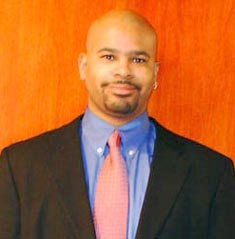
Ray Tebout
NEW YORK -- Getting shot was probably a critical turning point in Ray Tebout’s life, he says. It was 1990. Tebout had just turned 16 and was living on the streets of the South Bronx, selling drugs and doing his best to survive. And then some guy had to go and shoot him in the foot.
The day of the shooting Tebout was on the corner selling drugs when “a guy wanted something from me,” he said. “I gave it to him but he decided he wanted something from someone else.” The man got angry and walked away but then — suddenly — he turned around and shot Tebout.
“Getting shot in the foot may not sound like much,” he said, “but it’s pretty horrible.”
Homeless, with his foot in a cast and walking on crutches, Tebout was mostly immobile, at least by the standards of drug dealers in the South Bronx.
“Losing your mobility in such a predatory environment was tough,” he said. You can’t sell drugs, he added, because you can’t run from the cops or the thugs.
He may not have been able to walk, but this was still the first step toward turning his life around. But it was only the first, very tiny step and it would be years, spent in and out of prison, before his life would be truly stable; before he stopped burglarizing stores because he was starving, homeless and desperate.
In early February, Tebout sat on a panel discussing prisoner reentry during the second day of the John Jay College/Guggenheim Symposium on Crime in America held here. His words held an added resonance as he was the only speaker on the panel to have actually been to prison. But now Tebout stands on the other side of the wall, counseling former inmates like himself and proving that a prison sentence doesn't preclude you from becoming a leader in your community. Tebout is now director of counseling at College Initiative, a reentry community organization in New York City that helps the formerly incarcerated transition into college.
Tebout was born in Manhattan in 1974 but spent his youth travelling the country with his family, finally landing in the Bronx when he was 12. All those years of travel isolated him from other kids, leaving him with very limited social skills.
“I was a misfit there,” Tebout said. “I was decently educated, but not socially educated. I read well but I had zero social skills.”
Suddenly he was an awkward suburban kid dropped into a “hostile urban environment.” It wasn’t long before he was committing petty burglaries and selling drugs.
“My first criminal activity was to fit in,” he said. “It gave me something to bond over with folks. When you are interested in engaging in criminal activity you find the people involved in criminal activity.”
It was an important step in the wrong direction, but Tebout says, “It took me out of the position of least powerful in my social group.” And eventually, he says, his petty crimes became more violent.
Tebout’s father had sent him to a number of good schools, but he struggled with authority and got kicked out of them all. “That didn’t work out,” Tebout said simply. Frustrated and facing his own troubles with addiction, Tebout’s father kicked him out. He was 16.
Tebout lived on the streets of the Bronx for 10 months, selling drugs to survive. But he soon realized there was an easier way, he said, and he started looking for people to rob.
“It was a lot easier to rob people than it was to stand on a street corner and sell drugs,” he said.
But then he was shot, left defenseless in a dangerous place and was soon arrested for burglary.
“I was hungry, it was cold and I needed something to eat so I burglarized a store with a couple of guys,” Tebout said. “They got away and I didn’t.”
Tebout was soon back on the streets, his case dismissed and sealed.
When he was 18, in 1992, everything fell apart once and for all when a late-night robbery went sideways. Tebout wanted to make some money. His sister was struggling and he wanted to help her out.
“I was already robbing people,” he said, “so I decided to go out and look for somebody and at the end of the night in a quiet subway station I found a guy.”
Tebout's target pulled a gun on Tebout and tried to shoot him but he managed to wrestle the gun away from the man. Then Tebout pistol-whipped him.
Tebout says he still feels remorse for the attack.
“That was probably one of the worst things I have ever done,” he said. “I think about what that man must have gone through and it’s horrifying. I feel really terrible about it.” Having been attacked himself, Tebout said, he knows the pain the man must have gone through.
He was convicted and sent to prison for 11 years. His time there, Tebout says, was horrible.
“I think I only slept, ate and fought for the first year,” he said. Soon he got involved with gangs on the inside. Tebout is a big guy, tall with a shaved head, and intimidating, but everyone can use protection.
“In some ways [gang members] were essential to helping me out with my time,” he said.
But his first seven years in prison weren’t moving him any closer to rehabilitation. Tebout was actually adding more time to his sentence.
“As I stayed in prison my time got increasingly violent,” he said. “I got an additional one and a half years. It was escalating and escalating.”
Tebout appeared lost, a young man who only knew violence and crime. But his grandmother, like so many grandmothers, knew her grandson better. She wrote Tebout in prison and asked him simply to be a good citizen. He listened.
However, his rehabilitation wasn’t overnight. His criminal behavior faded away slowly, partly out of necessity.
“For gangs that means your defenses are down,” he said. “You are vulnerable and I had to be careful.”
He didn’t stop getting in trouble, he says, but he was more thoughtful and stopped being reckless.
But one day, he says, he prayed and then he was done.
“I’m out,” he says he thought at the time. “I’m not going to put my hands on anybody. I’m going to go out and be a good citizen.”
His good behavior didn’t go unnoticed by prison administrators and they offered him spots in rehabilitation programs telling him his participation could lead to an early release.
Tebout went along with it, mostly because he wanted to get out of prison faster, he says, but eventually he saw they were helping.
“The value of those programs to me,” Tebout said, “was that it started me thinking differently.”
One program defined criminal thinking as the lazy, easy way out and helped Tebout identify the steps to stop him thinking like a criminal.
“I needed to start pursuing the longer, harder road,” he said.
And he did, becoming part of the 33 percent of ex-offenders who do not recidivate according to an offender reentry report for Congress.
Speaking on the same panel as Tebout at the February symposium at John Jay College, attorney Margaret Love described some of the difficulties many former inmates face.
"There are more and more laws that exclude people with convictions from a variety of benefits," she said. "There are upwards of 35,000 laws."
Even harder to deal with is the social stigma, she says.
"Most people who are convicted are not a public safety threat," she said. "But the pervasive backgrounding and the fear that has overcome us since 9/11 has made it very easy to exclude people who have characteristics we fear."
Tebout was released from prison when he was 29. He has $170 in his pocket and the support of some positive friends. Tebout is still proud that he didn’t land in a homeless shelter upon release and instead stayed with an old friend from high school.
He started working in restaurants and used the money he earned to put himself through culinary school. He cooked professionally for two years but he said, “I realized I was doing more counseling in the kitchen than cooking.” So he switched gears and moved into human services.
He continued to work hard, earning credentials in substance abuse counseling and entrepreneurship teaching all while working as a counselor at the Fortune Society, a social service and advocacy group that supports successful reentry into society after prison. He later joined College Initiative and enrolled in the John Jay College of Criminal Justice where he is pursuing a bachelor's degree.
His work has done more than just keep him out of prison, it’s given him a purpose.
“No one was addressing the needs of those being released from prison,” he said. “It’s very rewarding.”
According to the Reentry Policy Council, many communities have few, if any, reentry assistance programs. Through his counseling work, Tebout is working to change that.
Tebout brings a lot of personal experience to his counseling work and says he knows how to approach teenagers in danger of travelling the same path to prison that he did. It’s all about choices and Tebout can’t make decisions for them.
“I’m not here to tell you what to do,” he tells his mentees, “but here are your options.”

Thank you for this story. It’s good to read something positive and to realize that peole can change and learn how to make better decisions for their lives.
Thanks for the nice post,Its really informative and valuable.